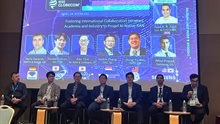6G and the labor market: What is needed to seize the opportunities?
In order to gain timely insight into the human capital needed to make optimal use of the possibilities offered by 6G – especially given the current tight labor market – TNO conducted an initial exploratory study. The main question of this study was: " What is needed in terms of human capital to optimally utilize the opportunities that 6G offers?". To answer this question, TNO interviewed nine experts in the field of 6G and organized three working sessions as part of the FNS Human Capital program. Although there is still a great deal of uncertainty about the final form and adoption of 6G, this exploratory study has already provided an initial picture of the expected consequences for employment.
The study looked at various components of the 6G development process and their impact on human capital:
- Production: More computer chips, fiber optic cables, and (new) antennas are expected to be needed. Experts agree that the demand for chips will grow exponentially, possibly by a factor of 10 to 100. There was less agreement on the demand for antennas. Expectations range from a similar number to 10 times as many, or even 100 times as many. In addition, more fiber optics will be needed to build the 6G network. This will lead to a significant increase in work for manufacturers, but the skills required will not change significantly.
- Construction of physical infrastructure: A significant increase in work is expected, especially for the construction, installation, and connection of antennas and fiber optic cables. This work is not considered to be more complex, but it will be more extensive. More data centers and/or more efficient data centers will also be needed to handle the increasing data traffic.
- Network maintenance (physical): Little change is expected here, as smarter systems can monitor and manage more remotely, requiring less physical work.
- Software development: The work for software developers will increase and become more complex, with a growing role for AI and a shift of intelligence to the cloud. The same applies to system integrators, who bring systems together into a working whole at the providers. However, both groups are used to changing, because they already have to do so now.
- Network management: The work will become more complex and the task more extensive. At the same time, more and more tools and AI support are becoming available to help manage this complexity and make work processes more efficient. The people who currently work in this field are also used to dealing with this kind of change. Nevertheless, an increase in work is still expected, particularly in scarce positions such as network management and security, due to the increasing amount of data and the more flexible use of data centers.
- Marketing: The sales market will mainly focus on customized solutions for companies, such as port companies or factories, rather than direct consumer sales. The content of the work is changing, with a greater need for company-specific knowledge.
- Applications (indirect): There will be more work for app developers, and this work may become more complex due to the more intensive interaction between networks and devices. However, this professional group is accustomed to change.

Respondents expect 6G to have a major impact on employment, while the demand for fundamentally different skills within existing professions will cause fewer bottlenecks. Given the high degree of uncertainty, it is difficult to make quantitative estimates.
In addition, there are several relevant developments that have not been covered in detail in this study, but which are expected to influence the labor market in relation to 6G. For example, it is expected that 6G technology will initially be applied in specific business locations, such as large distribution centers. The concept of the Factory of the Future (FoF) is also gaining popularity. Although we did not speak to anyone with in-depth knowledge of this subject in this study, we anticipate that the emergence of such smart, highly automated factories will have a major impact on the nature of work.
Roles such as operators will change due to the integration of advanced systems, while new roles will emerge, such as digital product developers and data analysts. Important skills in this context include digital literacy, the ability to collaborate with technology (such as cobots or AI systems), and a strong willingness to learn. It is therefore important that future labor market analyses also take these developments into account.
Next steps
The insights from this research are a good starting point for setting up Learning Communities (LCs). With LCs, we want to bring together governments, businesses, and education to work, innovate, and learn together. Because there is still a lot of uncertainty about the consequences of 6G, we see the need for follow-up research in the future. In the meantime, we will continue to monitor the labor market and try to respond to new developments.
Download the full study here!



